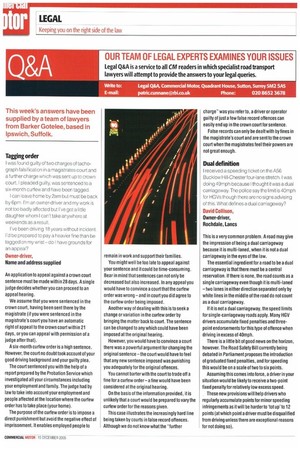This week's answers have been supplied by a team of lawyers from Barker Gotelee, based in Ipswich, Suffolk.
Page 40

If you've noticed an error in this article please click here to report it so we can fix it.
Tagging order
I was found guilty of two charges of tachograph falsification in a magistrates court and a further charge which was sent up to crown court. I pleaded guilty, was sentenced to a six-month curfew and have been tagged.
I can leave home by 2am but must be back by 6pm. I'm an owner-driver and my work is not too badly affected but I've got a little daughter whom I can't take anywhere at weekends as a result.
I've been driving 18 years without incident. I'd be prepared to pay a heavier fine than be tagged on my wrist—del have grounds for an appeal?
Owner-driver, Name and address supplied An application to appeal against a crown court sentence must be made within 28 days. A single judge decides whether you can proceed to an appeal hearing.
We assume that you were sentenced in the crown court, having been sent there by the magistrate (if you were sentenced in the magistrate's court you have an automatic right of appeal to the crown court within 21 days. or you can appeal with permission of a judge after that).
A six-month curfew order is a high sentence. However, the court no doubt took account of your good driving background and your guilty plea.
The court sentenced you with the help of a report prepared by the Probation Service which investigated all your circumstances including your employment and family. The judge had by law to take into account your employment and people affected at the location where the curfew order has to take place (your home).
The purpose of the curfew order is to impose a direct punishment but avoid the negative effect of imprisonment. It enables employed people to remain in work and support their families.
You might well be too late to appeal against your sentence and it could be time-consuming. Bear in mind that sentences can not only be decreased but also increased. In any appeal you would have to convince a court that the curfew order was wrong — and in court you did agree to the curfew order being imposed.
Another way of dealing with this is to seek a change or variation in the curfew order by bringing the matter back to court. The sentence can be changed to any which could have been imposed at the original hearing.
However, you would have to convince a court there was a powerful argument for changing the original sentence —the court would have to feel that any new sentence imposed was punishing you adequately for the original offences.
You cannot barter with the court to trade off a fine fora curfew order—a fine would have been considered at the original hearing.
On the basis of the information provided, it is unlikely that a court would be prepared to vary the curfew order for the reasons given.
This case illustrates the increasingly hard line being taken by courts in false record offences. Although we do not know what the -further
charge" was you refer to, a driver or operator guilty of just a few false record offences can easily end up in the crown court for sentence.
False records can only be dealt with by fines in the magistrate's court and are sent to the crown court when the magistrates feel their powers are not great enough.
Dual definition
I received a speeding ticket on the A56 Bucklow Hill-Chester four-lane stretch. I was doing 49mph because I thought it was a dual carriageway. The police say the limit is 40mph for HGVs though there are no signs advising of this. What defines a dual carriageway?
David Collison, Owner-driver, Rochdale, Lancs This is a very common problem. A road may give the impression of being a dual carriageway because it is multi-laned, when it is not a dual carriageway in the eyes of the law.
The essential ingredient for a road to be a dual carriageway is that there must be a central reservation. If there is none, the road counts as a single carriageway even though it is multi-laned —two lanes in either direction separated only by white lines in the middle of the road do not count as a dual carriageway.
If it is not a dual carriageway, the speed limits for single-carriageway roads apply. Many liGV drivers accumulate fixed penalties and threepoint endorsements for this type of offence when driving in excess of 40mph.
There is a little bit of good news on the horizon, however. The Road Safety Bill currently being debated in Parliament proposes the introduction of graduated fixed penalties, and for speeding this would be on a scale of two to six points.
Assuming this comes into force, a driver in your situation would be likelyto receive a Iwo-point fixed penalty for relatively low excess speed.
These new provisions will help drivers who regularly accumulate points for minor speeding infringements as it will be harder to 'tot up' to 12 points (atwhich point a driver must be disqualified from driving unless there are exceptional reasons for not doing so).






















































































































































































